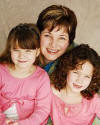Jul 16 2008
Clearing the Air on Education
Let’s clear the air: Here is my take on education. It was only five years ago that Kindergarten teachers were teaching everything you needed to know in Kindergarten, starting at day one.

Now, kids are expected to KNOW things, and are tested on the following within the first few months of Kindergarten:
- The upper case alphabet out of sequence or mixed up. Kids will be asked to name the letters listed, such as: B, D, X, K, J, M, O, etc.
- The numbers to 10, out of sequence or mixed up. Kids will be asked to name the letters, listed, such as: 2, 5, 9, 8, 1, 3, 4, etc.
- Kids will be asked to identify basic colors: red, orange, yellow, green, blue and purple
- Kids will be asked to identify basic shapes: circle, diamond, rectangle, triangle, oval and square
- Kids will be asked to identify basic coins: penny, nickel and dime
As the year progresses, Kindergartener’s will need to know both upper- and lower-case letters and numbers (up to 30), in- and out-of-sequence. More colors and shapes will be added including hexagon and octagon and more coins such as quarter and dollar.
Children need to know their name, address and phone number and be able to get dressed for outside play and use the bathroom independently, to make that first year a success!
So when the first parent teacher conference happens, your teacher gives you the results. Your child only knew 5 of 26 letters all mixed up, only recognized the number 1-5 mixed up to 10, could identify basic colors, correctly identified the circle, diamond and a square and was not able to identify the coins, penny, nickel or dime.
Many parents disengage with education at that point – at their first Kindergarten parent teacher conference!!!! In their mind, they are thinking—why did you not tell me before Kindergarten that this is what kid needs to know? Coins? I thought my kid would swallow coins—never thought I needed to teach them that before Kindergarten!
Sadly our early education teachers are not aware of how advantage the Kindergarten curriculum has become. I do presentations to early childhood teachers who, many times, are not part of a public school system and fall through the cracks. This is one of the problems with education today.
A parent’s first touch with education needs to be Public Service Announcements and teaching that education for their child(ren) should begin when they are toddlers.
My “Let’s Get Ready” books are what kids will be working on for the entire Kindergarten year, so the more they see it, the more it will make sense when they have that “aha moment”.
It’s like the seat belt law. If you teach a child to wear their seat belt, they will teach their parents, grandparents, older siblings and family friends to wear theirs.
With my books, the kids will teach their parents that they, too, need to be involved in the educational process for them to succeed! REMEMBER: Parents are our children’s FIRST TEACHERS!
And, did you know that there is no standard Kindergarten text book? Think about that. No text book for Kindergarten! How can you build a house without a blueprint? How can you not not use Let’s Get Ready For Kindergarten?
